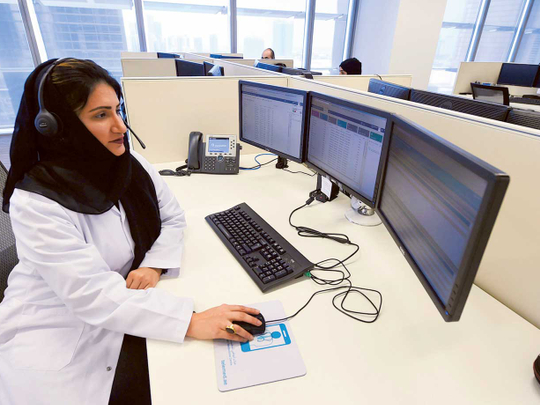
Abu Dhabi — To cater to the growing demand for health care in the UAE, a remote health care provision service has been helping residents receive answers to their medical concerns from their homes.
And officials at the Abu Dhabi Telemedicine Centre say the 24/7 service helps reduce the burden on the UAE health care system while also helping patients feel secure.
“UAE residents tend to make an average of 4 to 14 visits to the clinic per year, but a great proportion of these medical issues can be solved remotely. One reason why patients frequent hospitals is because they are not sure of the severity of the medical issue, and believe that specialist advice is necessary,” Dr Sameera Al Obeidli, lead physician at the Centre, told Gulf News.
The centre therefore offers medical advice for non-emergency cases, and has helped diagnose 1,700 different medical conditions so far. It was developed by Abu Dhabi Government-owned development company, Mubadala, in collaboration with long-term Swiss telemedicine provider, Medgate.
“We find that nearly half of all medical non-emergency concerns can be resolved over the phone. We also ease patients’ concerns by recommending what kind of doctor they should approach if required. In general, healthy residents must only need to make about three to four hospital visits a year,” Dr Al Obeidli said.
For now, the centre’s services are available to 1.3 million residents across the country who have insurance plans provided by The National Health Insurance Company (Daman). This includes all Emiratis in Abu Dhabi Emirate, who are covered under Daman’s Thiqa plan.
Coughs and colds, stomach illnesses, fevers, skin conditions, neck and back pain, asthma, allergies and paediatric illnesses make up the top concerns for which residents call the centre.
“Our physicians can advise on the dosage of medication, or what drugs to take for the common cold. We also get a lot of calls from new mothers and pregnant women,” Dr Al Obeidli said.
At present, many callers live away from urban centres.
“Thirty per cent of our callers live in rural areas that are far removed from the nearest health care facility. A large number of patients are also residing in Fujairah and Ras Al Khaimah,” Dr Al Obeidli said.
In addition, the centre has witnessed a significant increase in interest from Dubai, with a tenfold jump in January 2016 compared to the same month last year.
Other telemedicine providers have also begun operating over the last few years.
As reported by Gulf News in May 2014, mobile doctors is another service that allows residents to contact a medical professional with their queries.
How it works
Patients call the facility toll-free or contact it through a dedicated smartphone application, and initially speak to a licensed nurse regarding their symptoms.
Within the next 30 minutes, they are called back for medical consultations with one of the centre’s physicians. In some cases, the doctor can also recommend that the patient visits a health care facility, and advises them on where to go and what to do beforehand.
After the initial conversation, the centre follows up with the patient at recommended intervals.
“For a patient suffering from diarrhoea, we check back within 24 hours. And we check on those with fevers every hour or so,” Dr Al Obeidli said.
For details, contact Abu Dhabi Telemedicine on toll-free number: 800 4959












